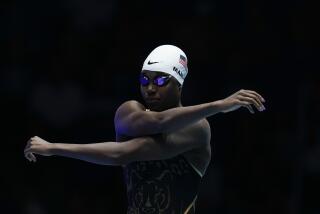COMING BACK : Chris Silva Proves Campanis’ Remarks Don’t Hold Water
- Share via
Chris Silva, the first black swimmer to compete for the United States in an international meet, was surprised to hear that Al Campanis had said there were no black swimmers.
So surprised, in fact, that the former UCLA swimmer said Thursday that he’s going to make a comeback.
Take that, Al Campanis.
Silva won a silver medal in the World University Games at Edmonton, Canada, in 1983 and was the first black swimmer to set an American record.
Campanis, then the Dodger vice president for player personnel appearing on ABC’s “Nightline” earlier this month, said, among other things, that blacks can’t swim because they have no buoyancy. Two days later, he was fired.
“I would like to say to Mr. Campanis--’Thanks, I needed that.’ I would like to thank Mr. Campanis for giving me the motivation to make a comeback,” Silva said.
“I’ve been working out on my own, but I’ve been kind of wishy-washy about whether to give it the kind of effort it would take to try to compete in the ’88 Olympics. He put that competitive fire back in me.”
Silva, 25, has not yet sat down with UCLA Coach Ron Ballatore to decide on a training regimen or to pick a meet in which he’ll make his competitive comeback for the Bruin Swim Assn. Possibly it will be the National long-course meet at Clovis, Calif., July 27-31.
He hopes to be able to make either the Pan-Pacific team that will compete in Australia or the Pan American Games team that will compete at Indianapolis.
Silva missed making the ’84 Olympic team by four-tenths of a second. Close, yes. But not all that close in a 100-meter sprint, when everyone at that level is within a touch. He’ll also have the 50-meter race to go for this time, an event that has not recently been included in the Olympics.
Still, he knows that he’s risking a lot of work over the next year--his 19th as a competitive swimmer--when making the team at age 26 has to be considered a longshot.
“The important thing is for me to give it my best shot,” Silva said. “I’m out there doing clinics for kids and trying to be a role model that way, but I think I can do a better job as an active swimmer.
“I haven’t accomplished all that I have wanted to accomplish. I never wanted to be the fastest black swimmer. I wanted to be the fastest swimmer. . . . I feel really motivated and inspired right now. . . . I think it’s important for me to try.”
Silva thought it was important to stay involved with swimming even after he thought he was finished in the pool.
He’s one of about 50 members of U.S. Swimming’s Olympic International Operations Committee.
He was a little late to the last meeting in Colorado Springs, Colo., because of bad weather. When he walked in, the meeting was already under way, so his entrance caused an uncomfortable moment of silence.
Silva gave a little nod of acknowledgement and, with a smile, announced: “Al Campanis said to tell everyone hello.”
The line was good for a laugh. A lot of people have been kidding Silva about Campanis’ remarks lately.
“It was funny,” Silva said. “The day after he said those things--and I didn’t see the show--my phone went crazy. The first calls on my machine were from Bill Barrett and Robin Leamy. Bill was wondering if we had to give our relay record back, now that everyone knows Silva can’t swim.”
Barrett, Leamy and Stuart MacDonald swam with Silva on UCLA’s 400-yard freestyle relay team that set an American record in 1982, the year that the Bruins won the National Collegiate Athletic Assn. title.
Silva can joke with his friends about a statement that they all know is outrageous.
But in the bigger picture, it’s really not funny.
“I’m right in the middle of it, and I can see it both ways,” Silva said. “With my friends, I can joke. With people who I know do respect me, we can joke about somebody saying something so ridiculous. But on the other hand, there are a lot of people who are naive.
“The bottom line is that there is racism everywhere, whether it’s around the corner, or right in your face. There probably are people who really believe that black kids lack buoyancy when the fact is that black kids lack country club pools.
“I really would like to thank Mr. Campanis for bringing this kind of attention to the issue. We’re trying to get more black kids involved in swimming, and he’s giving us a vehicle to tell them that it’s possible.”
Just last weekend, Silva helped with a swimming clinic for a major club, SwimAtlanta, that also included a smaller club from the inner city in Atlanta, mostly black. A year ago, the club had 12 swimmers. It now has 104 and is expecting 200 by the end of the year.
Atlanta Mayor Andrew Young--who is black and was a competitive swimmer in his youth--also made an appearance.
“When I got off the plane, there was someone from a radio station there wanting to talk about all of this, too,” Silva said. “I’m glad to talk about it. I wish more people would call. We need to talk about it.”
Silva didn’t become a swimmer in order to be a pioneer.
The Silvas were the first black family to move to Menlo Park, Calif., and his mother, Desiree, said that they found prejudice. Chris’ father, Raphael, was a chief steward in the U.S. Merchant Marine and had to be away from home a lot. It was his mother who got Chris to swimming lessons at the Sequoia YMCA and who invested the time it takes to keep a swimmer involved year around.
By the time Silva swam for Menlo-Atherton High School, he was one of the best.
When he chose UCLA, he also had about 100 other scholarship offers from swim coaches and water polo coaches.
“Besides the fact that a lot of black kids don’t have the opportunity to get involved with swim clubs when they are young, even if they do have access to a pool, another problem is that a lot of young black kids are looking for a sport that will offer them some kind of a future,” Silva said. “They’re watching Magic (Johnson) on television and thinking about the kind of contract basketball players can get.
“I think we need to stress to our young athletes, black and white, that education is the most important thing. Not too many of them are going to make it as pro athletes, but a lot of different sports can help them get a college education and a lot of rewarding experiences, and that includes swimming.”
More to Read
Go beyond the scoreboard
Get the latest on L.A.'s teams in the daily Sports Report newsletter.
You may occasionally receive promotional content from the Los Angeles Times.






